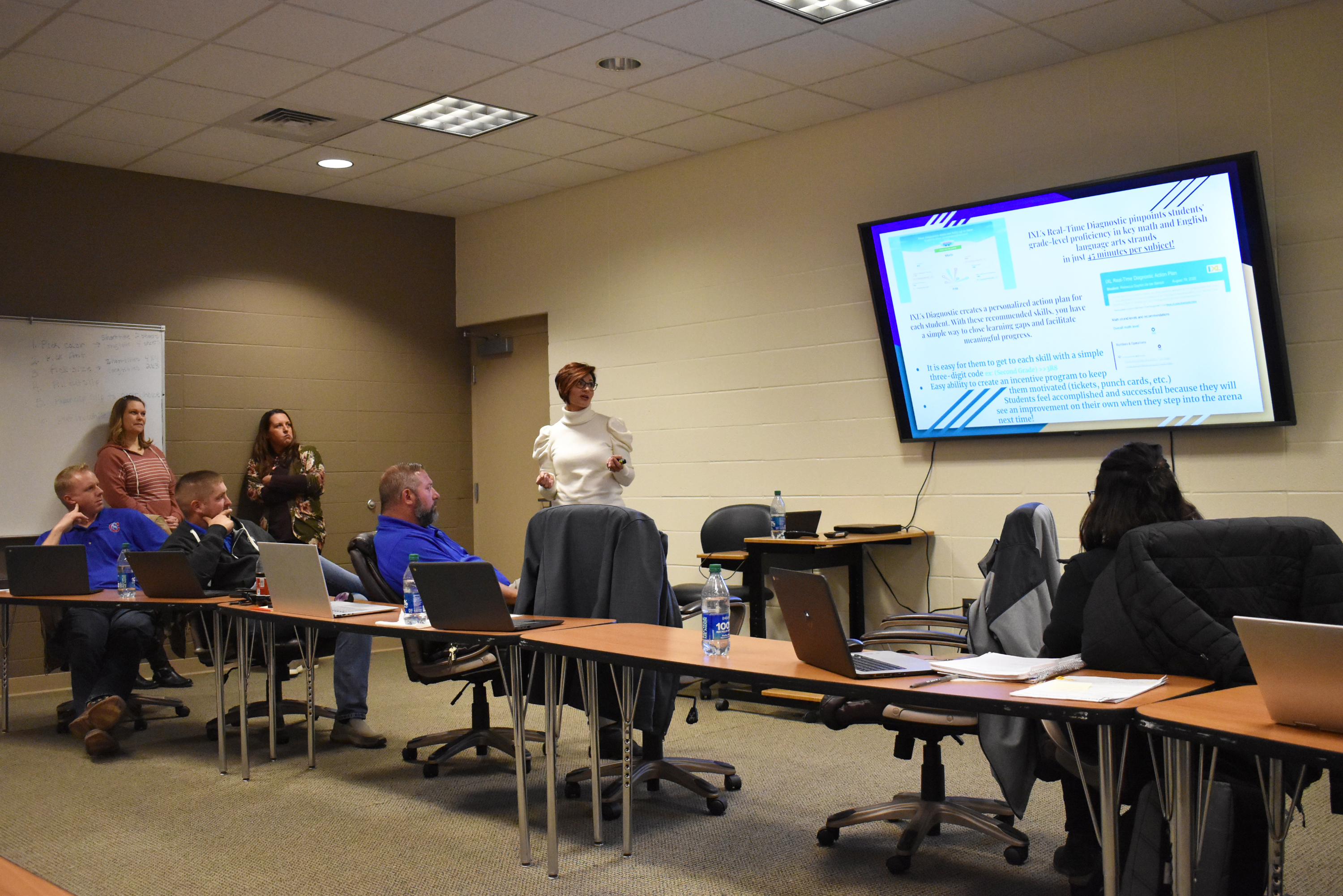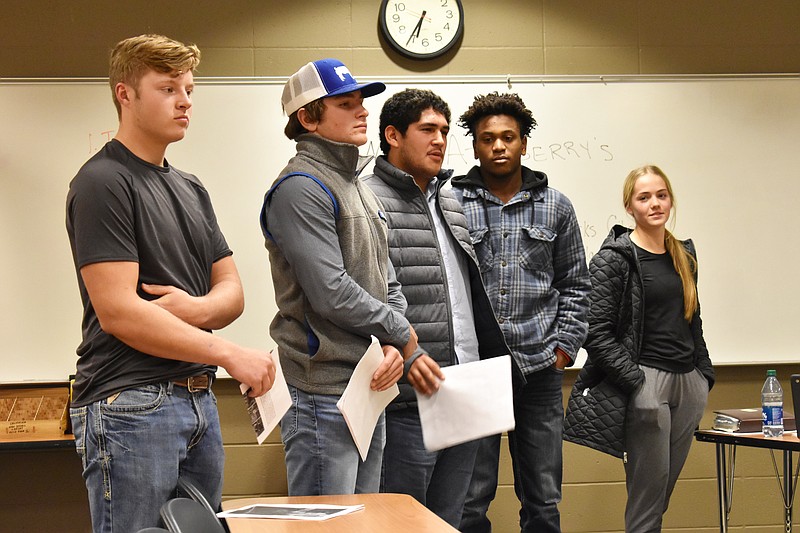A new swine barn is coming to California High School.
Agriculture students pitched the project during the new program spotlight portion of the California R-I Board of Education meeting Wednesday night. Teachers presented a second spotlight regarding the IXL learning program. Missouri Assessment Program (MAP) results and screening letters for dyslexia were also discussed at the meeting.
Swine barn
Five California agriculture students -- Chase Schlup, Collin Althoff, Alexis Anguiano, Ayden Bryant and Kierstyn Lawson -- presented the plans for a swine barn to the board during their spotlight. The facility would allow students without adequate space at home a place to house their pigs. The facility is slated to include 12 roughly 5-by-10-foot pens that can house swine year-round.
Anguiano explained the high school's agricultural program helped pique his interest in pigs.
"My family doesn't come from (an) agricultural background," Anguiano said. "... I've never seen a pig give birth. Honestly, I've never seen a real big old pig up that close, so I got a lot of educational (interest) there. My interest piqued whenever I watched it all happen, and from there I was eager to try to own a pig and try to do something more with FFA."
It wasn't long before Anguiano and classmate Bryant purchased their own pig over the summer. Anguiano said they stored the pig in the Denker Livestock Education Center, which sparked an idea to construct a separate facility for housing swine owned by students.
"This new swine barn, it will definitely help with people like myself and many other people who don't have those agricultural backgrounds and that would be a great thing for everybody," Anguiano said.
Althoff said the new barn would not only benefit students, but also the pigs themselves.
"Additionally, by having a separate facility, this will give less stress on the animals ... because there will be less noise, less people going in and out, and it will be cleaner and more sanitary for those animals," he said.
Lawson said the facility will be convenient since students can check on their pigs without having to drive outside town.
Althoff said wood chips on the floor would be changed at least every two weeks using the department's skid loader. Superintendent Daniel Williams said the facility should be cleaned more frequently due to the close proximity to the baseball/softball facility.
The students said the estimated cost for the facility is $15,000. The MFA Charitable Grants fund and MFA co-ops have already donated a combined $10,000, and the agriculture program is paying for the remaining $5,000. Most construction work would be done by students. Jacob Kueffer, a local concrete contractor, has volunteered to assist students to dig footings, and teach them how to set forms and pour concrete. Heating and ventilation systems for the facility were salvaged from a demolished greenhouse.
Once complete, students will be able to apply for space in the facility for housing their pigs. An ag instructor present at the meeting said priority will be given to students who don't have any other space to house their animals. The new facility will be dedicated to swine, with other animals still being housed in the livestock center.
The board approved the project.
IXL learning program
Three teachers informed the board about an online learning program being utilized throughout the elementary and middle schools.
Kelly Combs, a speech language pathologist at California Elementary School, introduced IXL as a learning program that can help determine the weaknesses and strengths of students, and offer tailored learning plans and in-depth practice.
"One of the biggest challenges for teachers is that we expect ourselves, and we are expected by the State of Missouri, to know and understand how every student learns and where they're at, and meet them where they're at to close gaps," she said. "And this really helps, it assists with that."
Combs said students use the program daily. She said students in her classroom typically use it for at least 22 minutes, but some exceed that by logging on during free time or while at home. She added the program is an "intrinsic motivator." Students are able to view their progress in real-time because it offers immediate feedback with detailed explanation of concepts. Students are able to better understand themselves and their learning style with the program.
During her presentation, Combs said 12 million students use IXL daily across the nation. The program is used in all top 100 districts in the United States, and in more than 190 countries.
The program offers courses in core subject areas -- math, science, social studies and English language arts (ELA).
For teachers, IXL can be an invaluable tool for determining which students may need additional help understanding a concept. Stephanie Zimmerman, a fifth-grade math teacher at California Middle School, said the program allows her to see which students may be struggling to understand concepts. If the entire class struggles, she can do a "Group Jam" where it can collaborate on practicing the concept.
Zimmerman said the program offers skill plans that can be used to incentivize students. For instance, she said last year she had students compete in a "boost challenge," where students could do two IXL lessons a day in a 20-day period. Students who completed all 40 lessons with 100 percent scores were rewarded with a prize. IXL also offers a "fall power-up" plan for four weeks, and the "weekly boost" plan spanning 32 weeks in both math and ELA. The program also offers test-preparation plans.
Dyan Ingram, a fifth-grade science teacher, discussed diagnostic tools within IXL. She said students step into an "arena" where they can work on math and/or ELA assessments. At the conclusion of the assessments, the program lists their strengths and weaknesses along with an action plan.
She said a student's progress is tracked and the diagnostics can be shared with parents at parent-teacher conferences. Parents can also view their children's progress through a student dashboard.
MAP test scores, dyslexia notice
During the administrator reports portion of the meeting, board member Paul Bloch asked middle school administrators about drops in MAP test scores.
According to tables included in California Middle School Principal Derek Scroggins' report to the board, many cohort scores fell between 2021 and 2022. For instance, fifth graders saw the largest decline in math scores, falling from 58.9 percent of students placing proficient and advanced in 2021 to only 28.9 percent in 2022, representing a 30-percentage point drop. Other large drops include fifth-grade ELA (with a 13-percentage point drop). Eighth-grade math, on the other hand, rose by more than 20 percentage points.
Administrators said there were many causes behind the declining scores, including COVID-19, use of full-time substitutes in the district and the Missouri Department of Elementary and Secondary Education (DESE) changing the tests.
Assistant Superintendent Matt Abernathy explained cohort results on their own don't show the entire picture.
"I've always felt like the building or grade level compared to the state or compared to other school districts at similar subject and grade level is much more valuable than looking at how we did in our district in one year to another. Because within our district, we don't know if we go down 30 points, is that because we have a fault in our district? It would look that way, but what if the state dropped 35 percent. Then we would still be 5 percent above where the state ends up."
Statewide results have yet to be released, Scroggins said.
Williams said DESE continues to change the MAP test, making it more difficult to live up to the state's expectations.
"We do have to be mindful (that the 2021 and 2022 MAP tests are) two different assessments, they changed it. They're also changing it again this year," Williams said. "So that's a real obstacle when we see an assessment and say 'OK, we know what to expect now' and can change some of our teaching habits to better teach the strands and skills that are present on the test. Every year or every other year there's a new assessment, where it's almost like when our students perform at a level that has been set, the bar has been set, when they reach that bar, the bar continues to raise. That's a struggle because it sends a bit of a message to public education that regardless how well your kids perform, they will never meet the expectation."
After discussing the MAP test results, board member Ryan Porter shared concerns over a letter he received about his daughter having dyslexic tendencies. California Elementary School Principal Jennifer Juergensmeyer and Ashley Frazier, director of special programs, explained the letters are required to be sent out per state law to parents of students who have been flagged as possessing dyslexic tendencies following a screening assessment. The district cannot officially diagnose whether students have dyslexia, but Frazier said the notices simply inform parents that the tendencies and child's reading level will be monitored.
Frazier further explained dyslexia doesn't always correlate with poor reading skills. She said some students can simply adapt.
In other action:
• The board approved the purchase of new aluminum bleachers for the baseball/softball facility at the high school. The new bleachers cost approximately $50,000, and will accommodate more spectators. The current bleachers were no longer accepted by the district's liability insurance.
• The board approved a cooperative agreement that would allow a Latham Elementary School student to wrestle at California Middle School.
• The board and patrons took a moment of silence to remember Candy Stepps, a former food service employee who worked at California Middle School for nine years. Stepps died Nov. 6.
• The board recognized Kenzleigh Goans and Ian Miller, who ranked eighth and 105th in the Missouri Cross Country State Championship. Goans was also named an All-State athlete.
• Band Director Jacob Small discussed progress with the band programs. Three students were selected in district auditions for the state band competition. The band programs will also be fundraising for a new trailer. He said their trailer is nearly 20 years old and has some leaks.
• Abernathy presented updates on installation of security film on windows, work done on finding a new phone service provider, professional development "Power Hours" and installation of security cameras around the district. He also said he will be present at the California Board of Aldermen meeting Dec. 5 to discuss the removal of the parking lot island at the elementary and middle school campus.
• Williams talked about the Missouri School Board Association conference he attended with Bloch and board secretary Susie Gorrell; a visit to Nichols Career Center in Jefferson City; community services provided by Central Missouri Community Action and the new El Puente Hispanic Ministry in California; his process for determining whether to cancel or delay school due to inclement weather; a Missouri Association of School Administrators budget workshop; plans for replacement of a heating, ventilation and air conditioning system at the elementary school; funding for staff; and progress on plans for a new secure-entry vestibule at the elementary school.
The California R-I Board of Education will next meet at 6 p.m. Dec. 14 in the California High School media center.
 Democrat photo/Garrett Fuller — Dyan Ingram, center, a fifth-grade science teacher at California Middle School, talks over points regarding diagnostic tools in IXL, an online learning program, during the California R-I Board of Education's November meeting Nov. 16 in the California High School media center.
Democrat photo/Garrett Fuller — Dyan Ingram, center, a fifth-grade science teacher at California Middle School, talks over points regarding diagnostic tools in IXL, an online learning program, during the California R-I Board of Education's November meeting Nov. 16 in the California High School media center.
